- Home
- Peter Straub
Julia Page 3
Julia Read online
Page 3
Julia forgot that she was going to see Lily: she forgot all about Lily. It was five thirty and still very hot; Julia felt the sun’s great weight on her forehead and arms. Like most London women, she was as white as if she lived under permanent clouds, and for a second considered that for the first time in years, she might get some color. Watching the child continue her intricate movements and brief, admonitory-looking bursts of speech, Julia felt peaceful, slowed by the sun, her tension for the moment gone. She had been right to buy the house; she had turned a corner, and could begin to live differently. For a second she thought the blond girl had darted a quick glance at her, but it was far more likely that she had merely looked sideways, aimlessly. There could be no doubt that she was the same blond girl Julia had seen before, floating along up the street: she did not really look like Kate, except for the accident of that silky, innocent, nearly white shade of hair, but she somehow suggested Kate. Oddly, watching her was not painful for Julia: Instead, there was a rootless exhilaration in it. Julia felt disconnected from everything, watching the girl, a pure, happy, sun-struck disengagement. The girl’s face, at Julia’s distance, looked aristocratically fine featured: her profile was heartbreakingly clear. She seemed to be not so much storytelling as lecturing— holding the others by force of personality.
Her hands were moving; something was held in her right hand. That was where the other children were looking. The girl laughed excitedly, and Julia saw some object flash in her left hand. She applied it to the thing in her right hand, apparently a square of green. The green square flipped in the air; it was like a rag. A little girl in the audience bent her head, and Julia saw her shoulders shake, as if she were overcome with giggles. The blonde girl spoke a few sharp words, and the other girl raised her head. Now the group of children had a huddled look; they were creeping forward, fascinated … but fascination, Julia saw, was not quite the correct word. It was as though, almost, they felt trepidation about getting nearer the girl: she was undoubtedly their leader.
Now the girl spoke quickly to the others, pointing an index finger. It was extraordinarily like a classroom. She gestured with the limp green thing. One of the other girls flinched. Then the blond girl continued working with her hands, the other children slowly gathering about her. Julia strained her neck to see what they were doing, but could see only the crown of the girl’s head. One of the smaller children began to cry.
In another second the performance had ended.
The other children drifted away, some of them running, excited, shouting. Others moved slowly, going toward the first sandbox, where they aimlessly milled about, scattering sand. These continued to glance at the blond girl, who remained sitting where she had been, her back to them. She was smoothing the sand with the palm of her hand, seemingly filling in a hollow she had made. It was clear from her posture that she knew she was being looked at, and that she expected it; she was at once self-conscious and unconcerned. When she had patted and smoothed the sand, she stood up in one motion and briskly wiped her hands. She seemed regal, lifting her head, and Julia’s heart contracted for her. The girl walked out of the little sand trap toward the path, moving directly toward Julia. Her face still bore an expression of watchful self-awareness. What complicated roles and rituals children have, Julia thought. She knew the girl would not look at her, and she did not. Once on the path, the girl turned deeper into the park, and after walking a few determined steps, broke into a run. In a moment she was traveling at top speed, racing up the path; in another moment, she had vanished before a knot of teenage girls whose long straight hair flipped like the tails of horses.
Julia stood—less gracefully than the blond girl had done—and went across the path into the play area. She still felt a little disoriented, as if she had just awakened after deep sleep. The sun felt unusually strong on her face. She wanted to see where the blond girl had been playing.
A small black girl, two or three, with a curly ruff of hair and huge mournful eyes appeared directly in front of Julia. She clasped her hands before the bib of her overalls and tilted back her head, staring up at Julia with her mouth open.
“What’s your name?” she asked.
“Julia.”
The girl’s mouth opened a fraction wider.
“Doolya?”
Julia raised her hand for a moment to the child’s springy ruff of hair. “What’s your name?”
“Mona.”
“Do you know the girl who was just playing in here? The girl with blond hair who was sitting and talking?”
Mona nodded.
“Do you know her name?”
Mona nodded again. “Doolya.”
“Julia?”
“Mona. Take me with you.”
“Mona, what was that girl doing? Was she telling a story?”
“She does. Things.” The girl blinked. “Take me with you. Pick me up.”
Julia bent down. “She does what? What does she do?”
Mona expressionlessly backed away a few steps, continuing to stare at Julia. “Poo,” she said. She giggled, revealing small perfect teeth. “Poo.” She turned away too quickly, fell on her bottom, and then struggled up on her feet and staggered off.
Julia looked after Mona for a moment, wobbling in the direction of the next sandbox, and went to where she thought the blond girl had been sitting. Julia knelt down above the spot. For a second she hesitated, wondering if she were trespassing on a secret or a code, and then she drew her hand along the sand as the girl had done. Her hand met no resistance. She repeated the action. Then she delicately scooped a little of the sand out of the hollow she had made. Very slowly, she continued to drag her fingertips through the little hollow. When the depression was three or four inches deep, her fingers touched something hard and metallic, and she dug cautiously around it, still using only one hand. Gradually she uncovered a small knife. Gummy sand was sticking to its blade. Julia looked at the knife in puzzlement and then scraped more sand from the hollow. Her fingers caught an edge of something hard, and almost without any pressure, she levered up from the sand the corpse of a small turtle of the size that had been sold to children for a quarter in Julia’s own childhood. It took her a moment to see that it had been mutilated.
Vomit rushed up from the floor of Julia’s stomach, and dropping the mutilated turtle and the small knife back into the hollow, she swallowed the bitter stuff back down again. With her foot she scattered sand over the turtle and the knife. Julia left the sand trap quickly, fearing she might faint, and moved toward a shaded bench on the main path through the center of the park. I’ll just sit here and catch my breath, she thought, before I see Lily. She unthinkingly rubbed her hands on her dress, and after a few ^ minutes noticed that she had left a small smear of blood along one seam. Sweat had broken out over her face; Julia blotted it on her sleeve, which instantly showed a series of dark crescents and ragged blotches. She made her mind empty: she concentrated on the sun, on the prickling she felt along her forearms and on her forehead. She was unable to look at the children.
After some minutes had passed, Julia raised her head and closed her eyes against the strong sunlight.
She needed sunglasses. Somewhere, she had sunglasses. They were back at Gayton Road. She could visualize them, their bows crossed, lying on a formica counter in the kitchen. She’d buy another pair. Yes, she thought, I jumped into reacting, I did not think. There was no proof the girl had killed the turtle or cut it up that way. Julia may even have been probing the wrong spot in the sand. Little girls so pretty did not do things like that: it was an unfair psychological rule that handsome children were healthier and more stable than ugly ones. In fact— Julia allowed the idea to seep cautiously into articulation—she had been upset because the sight of the turtle reminded her of what had happened to Kate.
She could speak of none of this to Lily. Making that resolution, Julia stood up from the bench and cut across the long stretch of grass, going toward Plane Tree House. She really did feel peculiar.
; 2
The two women sat on Lily’s terrace in the sun, now milder than it had been an hour before. “Poor Lily’s” hair, prematurely gray like Magnus’, had been cropped since Julia had last seen her sister-in-law, and it lay flat and short as a boy’s, emphasizing the fragile lines of her face and making her look more than ever at an oblique relationship to the rest of the world. Yet Lily had remained unruffled by Julia’s news and Julia’s high-pitched, taut mood. For half an hour, Julia had considered that Lily might be pleased that she would have Magnus to herself again, but she knew that this was grossly uncharitable: Lily simply did not respond as other people did. In the end, her news given, Julia had allowed herself to relax, cosseted by Lily’s hospitality—she was now drinking her third gin and bitter lemon, served in a tall glass chiming with ice—and Lily’s unpredictability.
“You are extraordinary, though,” Lily was saying. “Extraordinary and precipitous. You’re a regular heroine. I can’t imagine myself ever doing anything so reckless and brave.” “God knows I’m not brave,” Julia said, laughing. “Oh, but you are. You have a brave soul.” “Then I’m a coward with a brave soul.” “You mustn’t think it is cowardly to fear Magnus.
Magnus is not like anyone else. He has always been a terribly apart sort of person. He has command. Sometimes I think that Magnus is not from this world at all, or that he is thousands of years old, preserved by some black magic. I’ve had a reservoir of fear of Magnus since he was three years old. Even then, Magnus had an ancient, powerful soul. Of course, I think you were wrong to leave him, and I hope with all my strength that you will return to him.” Lily was drinking tea, and she followed these words by taking a birdlike sip at it, making it clear that she had at least one more thing to say. Julia, listening to this description of her husband, wondered how many times Lily had pondered in just this way on Magnus’ “ancient, powerful soul.” It was typical of her romanticizing of her brother. “But as my advice is universally ignored, I don’t suppose that you will immediately follow it.”
“You heard from him, Lily? What was he like?”
“Desperate, simply desperate. Of course, I couldn’t give him a crumb of solace. And his solace, you know, would be mine—I’d be desolate for him if I thought you were never going back to him.”
“I can’t.”
“He loves you. Since the only other person, apart from Kate, that Magnus has ever loved is myself, I am able to be quite certain.”
“Lily,” Julia insisted, “please don’t. I can’t take that now.”
After a moment while both women looked away from one another toward the park, Julia asked, “Was he angry?”
“I wouldn’t call it anger,” Lily said. “He was distressed.”
“Lily,” Julia said, “you have to promise me that you won’t tell him where I am. Never mind what you think is in my best interest or Magnus’, please don’t tell him. Promise me. Please.”
“I’ll promise you anything you like. But I’d be happier about it if you made me a promise too. I’d like you to tell me that you will consider going back to your husband.”
“Lily, I’ve bought a house,” said Julia, almost laughing. “I’ve bought furniture. It’s just…just impossible for me to face Magnus. I can’t make a promise like that to you. I can’t even think about Magnus.”
“On the contrary, it is my impression that you think of him all the time.” She looked interrogatively at Julia.
When Julia said nothing Lily went on. “It was no one’s fault about Kate, darling. You both very bravely did what you had to do. Magnus and you were both commended at the inquest, you know.”
“I can’t help that.”
“But it’s a pity that you were unable to hear it.” Conscious that she was too crudely leading Julia into an area she would be unable to enter for perhaps months, Lily resisted the impulse to be Magnus’ advocate in the matter of Kate’s death. The facts of her niece’s death were at least as clear in Lily’s mind as in Julia’s, and Lily knew, and could fully understand, that Julia had broken down afterward. In fact, Lily realized, she must have begun looking at houses only a day or two after she had come out of the hospital where she had been kept under sedation. Julia had left the hospital only to attend Kate’s funeral; even that had been a mistake. That pale, confused, drugged creature stalked through the rain by photographers—it was unlikely Julia had any memory of that morning. Apparently she had begun to make arrangements for bolting on her first day back at Gayton Road: Lily supposed that she had been unable even to look at Magnus straight. Of course, Kate’s death had been horrible. She had choked on a piece of meat, and Magnus and Julia, after dialing 999 and waiting minutes for an ambulance while their daughter fought uselessly for breath, had frantically decided to attempt an emergency tracheotomy. Kate had bled to death by the time the ambulance arrived. By Magnus’ report, Julia had been very calm, very controlled throughout: only the next day did she get funny. Even now she looked flushed and breathless; and was drinking far too much gin.
“Well, tell me about this house of yours/’ Lily said. “What number in Ilchester Place is it?”
“Twenty-five.”
“How odd that you should move to that street. Perhaps it is not odd at all, given that London is the sort of place in which all sorts of recurrences and coincidences occur.”
“Lily, what are you trying to say?”
“My brother used to visit a house in Ilchester Place, a long time ago. It was while he was at Cambridge. I believe he had a friend there.”
This comment fed a familiar stream of bitterness in Julia, who said, “Magnus and his friends. How boring all of that is. Maybe it comes from his having such an old, powerful soul.”
“Yes, it does,” said Lily, who seemed to be a little hurt.
“Lily, I’m sorry,” Julia quickly said. “Can’t we two be friends, without any relationship to Magnus? I want to begin a new life, I have to live on my own, I can’t stand to think of Magnus and I’m afraid to see him, so that’s done, but I want your friendship very much.”
“Why, my dear,” said Lily, “of course you have it. I want what is best for you. We are friends.”
Julia felt close to tears. “I’m going to have a new life,” she said, almost defiantly. “I want your help.”
“Of course,” Lily said, reaching out and taking Julia’s hand. It was cold from her icy glass, and some grains of sand still clung to it. She allowed Julia to weep for a few moments in silence.
“You need something to do, you know,” she said after Julia’s noiseless crying had ended. “Only bores suggest their interests to other people, but how would you like to attend our next gathering? Mrs. Fludd is our new interpreter. She was a real find, the most sensitive sensitive I’ve met since poor dear Mr. Carmen died. Not personally, of course. She is a real old cockney, tough as a boot. But she has the gift to an astounding degree. I am very enthusiastic about her—but if you scoff at these old-fashioned performances, my feelings won’t be bruised. It would be something for you to do, however.”
Ordinarily Julia would have made some excuse ? but she was touched by Lily’s kindness, and this made her feel guilty for her earlier deliberate rudeness. “Just tell me where and when,” she said. “It might be fun.” Then a troubling thought occurred to her. “They won’t… she won’t… do anything about getting in touch with… I mean …”
“There’s no question of it,” Lily said firmly. “Really, people have the most obsolete idea about what we do. I suppose you expect ectoplasm leaking from shadowy cabinets.”
“Okay,” Julia said, smiling. “Just call me whenever your gang has its next meeting.”
“Fine,” Lily said, clearly pleased. “Now I think I want to give you a present. In return, I hope you will allow me to snoop enviously through your house as soon as possible. Now excuse me.”
Lily left the terrace, and Julia closed her eyes for a moment. We make a wonderful pair, Lily and I, Julia thought, we’re both out of our tiny minds.
She thought of going round to see Mark, and then she ceased to think of anything at all.
Lily awakened her by stroking her shoulder. She was carrying a large yellow book under her arm, and had a pair of scissors in her other hand. “My dear, you’ve been asleep for half an hour,” she said.
“I’ve just been thinking about Mark,” Julia said. “I’d like to see Mark.” She felt once more full of energy.
“That might not be very clever, dear,” lily immediately said. “You’d be far wiser to leave Mark alone.”
Lily, having lost one brother to Julia, did not wish to lose the other; she had come closer to her adoptive brother over the past ten years, as Magnus had not; “poor Lily’s” defensive psychology seemed quite clear to her sister-in-law.
“Mark is so interesting,” Julia said, “and I hardly feel that I know him. Magnus scarcely let him in the house. He used to telephone me sometimes and we’d have these long, sweet conversations. He’s probably the only man I’ve flirted with since I married Magnus.”

 Poe's Children: The New Horror: An Anthology
Poe's Children: The New Horror: An Anthology Koko
Koko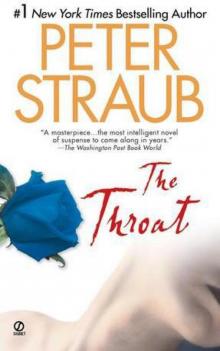 The Throat
The Throat Julia
Julia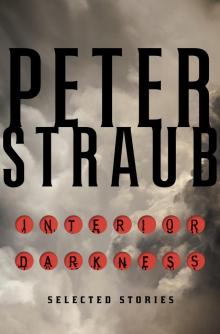 Interior Darkness: Selected Stories
Interior Darkness: Selected Stories A Dark Matter
A Dark Matter Floating Dragon
Floating Dragon Houses Without Doors
Houses Without Doors Mr. X
Mr. X Ghost Story
Ghost Story Mystery
Mystery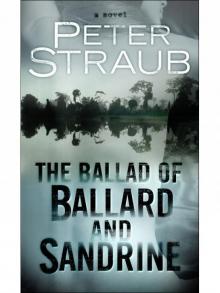 The Ballad of Ballard and Sandrine
The Ballad of Ballard and Sandrine Magic Terror
Magic Terror In the Night Room
In the Night Room Lost Boy Lost Girl
Lost Boy Lost Girl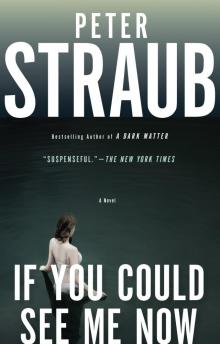 If You Could See Me Now
If You Could See Me Now The Hellfire Club
The Hellfire Club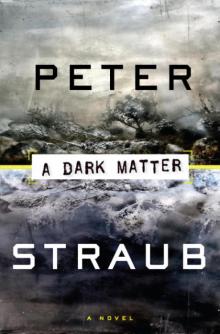 A Dark Matter: A Novel
A Dark Matter: A Novel Koko brt-1
Koko brt-1 Shadowland
Shadowland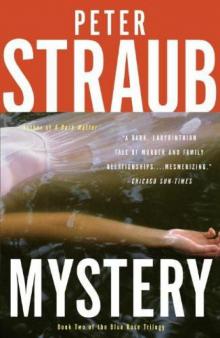 Mystery brt-2
Mystery brt-2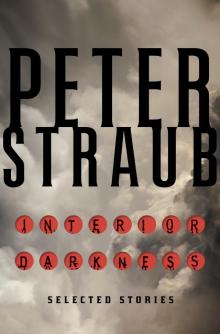 Interior Darkness
Interior Darkness Poe's Children
Poe's Children